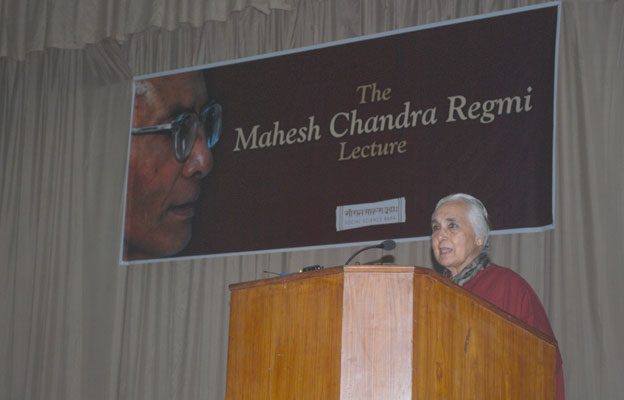Lecture Series
The Vamshavali from Chamba: Reflections of a Historical Tradition

The Mahesh Chandra Regmi Lecture 2009
14 October, Russian Cultural Centre, Kamalpokhari
The Vamshavali from Chamba: Reflections of a Historical Tradition
by Romila Thapar
It is commonly said that Indian civilisation lacks a sense of history. Why this idea was given currency needs to be considered and countered. This is the context of the lecture. Using the example of the Vamshavali from the hill state of Chamba (in the present-day Indian state of Himachal Pradesh), it is argued that this category of texts constitutes one form of the many historical traditions of the sub-continent. The historical background to the emergence to this kind of text might explain why it was so widespread as a genre. The contents of this Vamshavali and its form reflects the process of its composition both in drawing from earlier traditions and in making a statement about later events.
Among the world’s foremost experts on ancient Indian history, Romila Thapar earned her doctorate under A.L. Basham at the School of Oriental and African Studies, London, in 1958. She is Professor Emerita of Ancient Indian History at Jawaharlal Nehru University in New Delhi. Prof Thapar’s major works include Asoka and the Decline of the Maurya (1961), Ancient Indian Social History: Some Interpretations (1978), Recent Perspectives of Early Indian History (editor) (1995), A History of India Volume One (1966), and Early India: From the Origins to AD 1300 (2002).
Prof Thapar has been a visiting professor at Cornell University, the University of Pennsylvania, and the College de France in Paris. She was elected General President of the Indian History Congress in 1983 and a Corresponding Fellow of the British Academy British Academy. She is an Honorary Fellow at Lady Margaret Hall, Oxford, and at the School of Oriental and African Studies.
She has been awarded honorary doctorates by the University of Chicago, the Institut National des Langues et Civilisations Orientales in Paris, the University of Oxford, the University of Calcutta, and, most recently, the University of Hyderabad. In 2004, the US Library of Congress appointed her as the first holder of the Kluge Chair in Countries and Cultures of the South.
